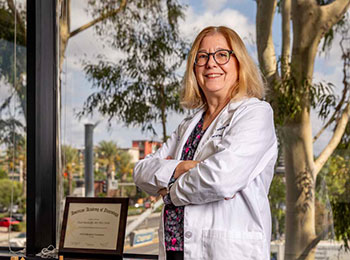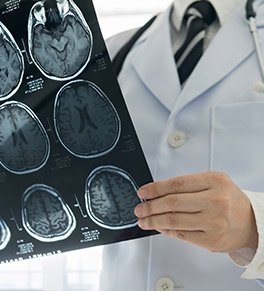
Neurosurgery
Finding out that you need neurosurgery can be scary. Our exceptional team will make sure you fully understand each step along your health journey.
Our neurosurgery team uses the latest technology to diagnose and treat you, and whenever possible, uses minimally invasive techniques.
Our approach to neurosurgery
If you're facing an upcoming surgery, it can be overwhelming. At UCI Health, we are fiercely patient-centered. Our neurosurgeons sit with you, explain your imaging tests, and gently guide you through your next steps.
Neurology is the diagnosis and treatment of disorders of the brain, spine and nervous system. Neurology and neurosurgery are among the most wide-ranging, complex areas of medicine.
Your nervous system controls:
- all five senses
- how you move
- your thoughts and feelings
- involuntary body functions like breathing and pumping blood
- and body activities like temperature regulation
Your neurological systems run almost every aspect of your life.
How we work together
When it's time for our neurosurgery department to help you recover from a disorder, our greatest strength is in our team approach. Because so many physical systems are involved in neurological treatment, we depend on our colleagues for their specialized expertise.
Take for example Cushing's disease. In that disorder, a benign pituitary tumor over stimulates cortisol production. Because of the tumor's location, recovering from this neurological illness would require the cooperation of an:
- Endocrinologist
- ENT specialist
- Neuro oncologist
- Neurosurgeon and
- Radiology team
Your case is unique, so your diagnosis will determine who your team members are. But our doctors work in a cooperative, collegial environment, consulting frequently about the best route for your care.
Looking for more options?
View all cliniciansWhy choose UCI Health for neurosurgery?
Our neurosurgeons have outstanding fellowship training and deliver innovative, compassionate world-class treatment
The brain and spine are two of the most delicate areas of your body. Our surgeons deeply understand your anatomy, perform complex surgeries and offer methodical follow up.
If you experience any of the following, our neurosurgeons offer advanced consultation, diagnosis, and treatment:
- a brain tumor
- vascular disease
- movement disorder
- epilepsy
- spinal problems
- chronic pain
- traumatic brain and spine injuries
- or many other conditions
You benefit from the research we do at Orange County's only university medical center
Our neuroscientists' work paves the way for innovations that extend and improve your quality of life. You may also have access to clinical trials and new therapies long before they're available to the general public.
We promise to see patients with urgent problems (brain and spinal tumors, as well as cerebrovascular problems) within 24 hours
A number of conditions like spinal trauma, malignant brain tumors and stroke need quick attention. If you have an urgent neurological issue, call this special number, 855-557-1531, for a 24-hour response time. Do not use this number for medical emergencies or regular appointments.
If you have an emergency, call 911.
Deep-seated brain tumors and blood clots are no longer beyond our neurosurgeons' reach
UCI Health neurosurgeons now offer hope to patients with previously inoperable brain conditions. We are among the first in Southern California to use a sophisticated tool called BrainPath. The device enables us to navigate between the natural folds and neural structures in the brain without damaging anything.

Our neurosurgeons are world class
We not only serve Orange County, many of you travel from out of state to work with our neurosurgery team. Let us get you back on track with excellent care.
Call 714-456-6966 to make an appointment.
Need to see a neurologist quickly?

Find a neurology clinical trial
Talk to your doctor to see if a neurology clinical trial is right for you.
Featured News Stories

Stem-cell therapy is a 'big leap' for Parkinson's treatment
UCI Health spine surgeons recognized for excellence
UCI Health spine surgeon shares top priorities for 2025
Featured Blog Posts

Parkinson’s disease: Knowledge is power

A 'dream come true' realized in Irvine
Dr. Michael J. Stamos once envisioned opening a small cancer center on the UC Irvine campus. What has emerged, he says, is so much more.

UCI Health epilepsy program delivers what others can't
Upcoming Events
6-7 p.m. +7 more dates
Traumatic Brain Injury Survivors Support Group
Korean Women's Cancer Support Group
The UCI Health Korean Women’s Support Group provides help and support for Korean-speaking women who are coping with a cancer diagnosis.
4-5 p.m. +7 more dates
Young Adult Cancer Support Group
The Young Adult Cancer Support Group provides help and support for individuals with cancer between the ages of 18 and 35 receiving active cancer treatment.




